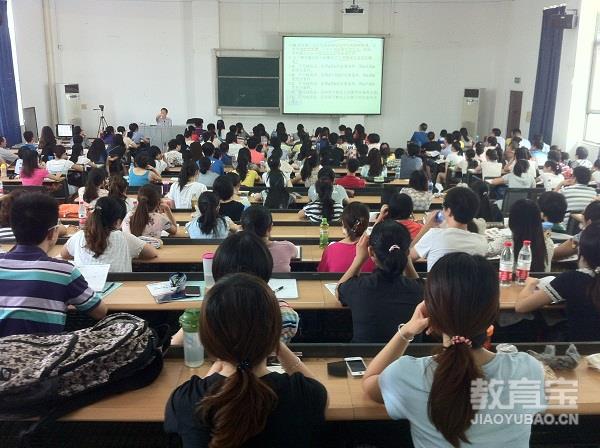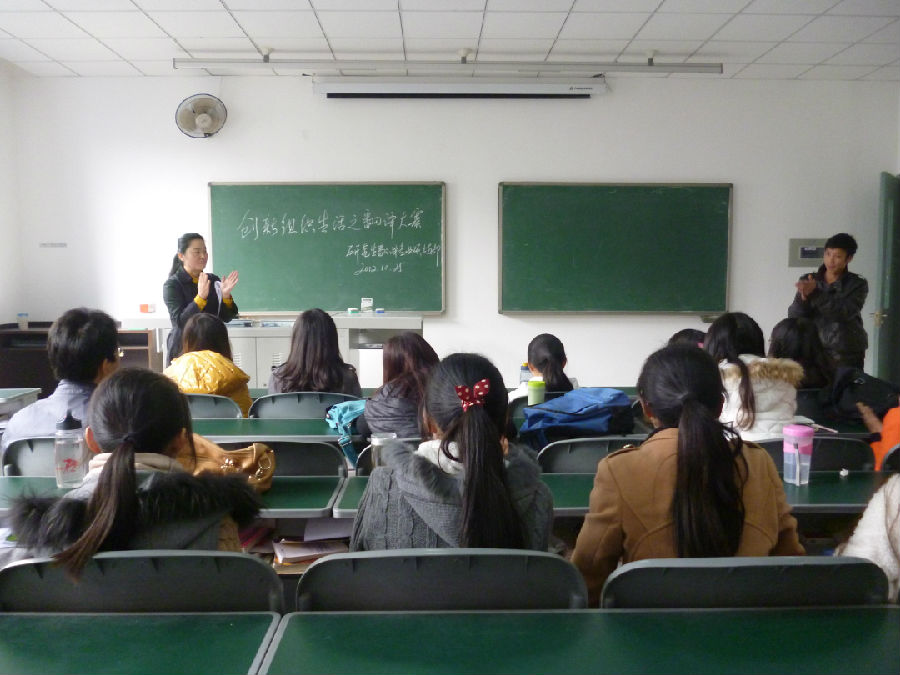 返回
教育头条
返回
教育头条

考研英语一模拟真题及答案分享 考研初试
下面小编跟大家一起了解考研英语一模拟真题及答案分享,希望对大家的学习有所帮助。
Directions:
Read the followingtext. Choose the best word(s)for each numbered blank and mark A, B, C or D on the ANSWER SHEET. (10 points)
In their quest tobuild profitable and more far-reaching digital audiences, publishers in the US and Europe have turned to the world‘s largest 1 network for help. Nine media organisations, 2 the BBC through its youth-oriented Newsbeat service, the Guardian and the New York Times, have 3a deal with Facebook to publish some of their 4directly through the socialnetwork rather than 5 hosting it on their own sites as part of a trial.
The 6 comes asincreasing numbers of readers rely on the social network as the main site 7which they receive news. Facebook wants not only to 8 users to news sites 9 tobe the place where they stay and consume it, too.Facebook already 10 nearly 20 per cent of the Guardian‘sweb traffic, excluding visits to its own apps, and about 15 per cent of 11to the New York Times site.
The Facebook dealfollows complaints by some 12 that internet groups such as Google and Facebook13 their own online businesses. Rupert Murdoch‘s NewsCorp, 14 , a critic of Googleand Facebook, is not participating. Others have 15concern that Facebook would have too much power 16 which stories appear andwhere they are placed.
Facebook said the 17would give publishers“control over their stories, brand experience and profit opportunities”,including 18 to some user data. Online sharing of news articles has already 19some readers away from publishers‘20 pages towardssocial media sites.
SectionⅡReading Comprehension
Part A
Directions:
Read the followingfour texts. Answer the questions below each text by choosing A, B, C or D. Mark your answers on the ANSWERSHEET. (40 points)
Text 1
There were someconsistent patterns among the heavier readers: For theyounger children—ages 6 to 11—beingread aloud to regularly and having restricted online time were correlated withfrequent reading; for the older children—ages 12 to 17—one of the largest predictorswas whether they had time to read on their own during the school day.
The finding aboutreading aloud to children long after toddlerhood may come as a surprise to someparents who read books to children at bedtime when they were very young butthen tapered off. Last summer, the American Academy ofPediatrics announced a new policy recommending that all parents read to theirchildren from birth.
“A lot of parentsassume that once kids begin to read independently, thatnow that is the best thing for them to do,”said MaggieMcGuire, the vice president for a website for parentsoperated by Scholastic. But reading aloud through elementary school seemed tobe connected to a love of reading generally. According to the report, 41 percent of frequent readers ages 6 to 10 were read aloud to athome, while only 13 percent of infrequent readers werebeing read to.
Of course, children who love to read are generally immersed in households withlots of books and parents who like to read. So while parents who read to theirchildren later in elementary school may encourage those children to becomefrequent readers on their own, such behavior can alsoresult from“a whole constellation of other things thatgoes on in those families,”said Timothy Shanahan, a past president of the International Reading Association.
There is not yetstrong research that connects reading aloud at older ages to improved reading

comprehension. Butsome literacy experts said that when parents or teachers read aloud to childreneven after they can read themselves, the children canhear more complex words or stories than they might tackle themselves.
“It‘s this idea of marinating children in higher-level vocabulary,”said Pam Allyn, founder of LitWorld.Org, a nonprofit group that works to increase literacy among youngpeople.“The read-aloud can really lift the child.”Other literacy experts say the real value of reading to children ishelping to develop background knowledge in all kinds of topics as well asexposure to sophisticated language.
21. It can beinferred from the first paragraph that _______.
[A] the youngerchildren and the older children have the same reading patterns
[B] for the youngerchildren, being read aloud regularly is good to theirschool days
[C] for the olderchildren, having time to read independently is veryimportant
[D] for the olderchildren, having restricted online time is good todevelop reading habits
22. The phrase“tapered off”(Para. 2) probably means_______.
[A] stopped halfway
[B] declinedgradually
[C] turned off
[D] readoccasionally
23. The authormentions“the report”inParagraph 3 to show that _______.
[A] reading aloudthrough elementary school is related to children‘sreading habits
[B] Maggie McGuire‘s viewpoint is wrong
[C] many parentsthink that children read independently is the best thing
[D] there is littledifference between frequent readers and infrequent readers
24. Which of thefollowing is NOT true according to Paragraphs 4-5?
[A] Children wholike to read are usually influenced by parents.
[B] The familyatmosphere is crucial to children‘s reading behavior.
[C] No obviousevidence proves reading aloud at older ages can strengthen readingcomprehension.
[D] Some literacyexperts believe there is no significance to read aloud for older children.
25. Pam Allyn arguesthat the advantage of read-aloud is that _______.
[A] it can enlargechildren‘s vocabulary
[B] it can reallyimprove children‘s reading ability
[C] it‘s helpful to enrich children’s knowledge
[D] it‘s beneficial for children to understand sophisticated language
Directions:
Read the followingtext. Choose the best word(s)for each numbered blank and mark A, B, C or D on the ANSWER SHEET. (10 points)
In their quest tobuild profitable and more far-reaching digital audiences, publishers in the US and Europe have turned to the world‘s largest 1 network for help. Nine media organisations, 2 the BBC through its youth-oriented Newsbeat service, the Guardian and the New York Times, have 3a deal with Facebook to publish some of their 4directly through the socialnetwork rather than 5 hosting it on their own sites as part of a trial.
The 6 comes asincreasing numbers of readers rely on the social network as the main site 7which they receive news. Facebook wants not only to 8 users to news sites 9 tobe the place where they stay and consume it, too.Facebook already 10 nearly 20 per cent of the Guardian‘sweb traffic, excluding visits to its own apps, and about 15 per cent of 11to the New York Times site.
The Facebook dealfollows complaints by some 12 that internet groups such as Google and Facebook13 their own online businesses. Rupert Murdoch‘s NewsCorp, 14 , a critic of Googleand Facebook, is not participating. Others have 15concern that Facebook would have too much power 16 which stories appear andwhere they are placed.
Facebook said the 17would give publishers“control over their stories, brand experience and profit opportunities”,including 18 to some user data. Online sharing of news articles has already 19some readers away from publishers‘20 pages towardssocial media sites.
SectionⅡReading Comprehension
Part A
Directions:
Read the followingfour texts. Answer the questions below each text by choosing A, B, C or D. Mark your answers on the ANSWERSHEET. (40 points)
Text 1
There were someconsistent patterns among the heavier readers: For theyounger children—ages 6 to 11—beingread aloud to regularly and having restricted online time were correlated withfrequent reading; for the older children—ages 12 to 17—one of the largest predictorswas whether they had time to read on their own during the school day.
The finding aboutreading aloud to children long after toddlerhood may come as a surprise to someparents who read books to children at bedtime when they were very young butthen tapered off. Last summer, the American Academy ofPediatrics announced a new policy recommending that all parents read to theirchildren from birth.
“A lot of parentsassume that once kids begin to read independently, thatnow that is the best thing for them to do,”said MaggieMcGuire, the vice president for a website for parentsoperated by Scholastic. But reading aloud through elementary school seemed tobe connected to a love of reading generally. According to the report, 41 percent of frequent readers ages 6 to 10 were read aloud to athome, while only 13 percent of infrequent readers werebeing read to.
Of course, children who love to read are generally immersed in households withlots of books and parents who like to read. So while parents who read to theirchildren later in elementary school may encourage those children to becomefrequent readers on their own, such behavior can alsoresult from“a whole constellation of other things thatgoes on in those families,”said Timothy Shanahan, a past president of the International Reading Association.
There is not yetstrong research that connects reading aloud at older ages to improved reading

comprehension. Butsome literacy experts said that when parents or teachers read aloud to childreneven after they can read themselves, the children canhear more complex words or stories than they might tackle themselves.
“It‘s this idea of marinating children in higher-level vocabulary,”said Pam Allyn, founder of LitWorld.Org, a nonprofit group that works to increase literacy among youngpeople.“The read-aloud can really lift the child.”Other literacy experts say the real value of reading to children ishelping to develop background knowledge in all kinds of topics as well asexposure to sophisticated language.
21. It can beinferred from the first paragraph that _______.
[A] the youngerchildren and the older children have the same reading patterns
[B] for the youngerchildren, being read aloud regularly is good to theirschool days
[C] for the olderchildren, having time to read independently is veryimportant
[D] for the olderchildren, having restricted online time is good todevelop reading habits
22. The phrase“tapered off”(Para. 2) probably means_______.
[A] stopped halfway
[B] declinedgradually
[C] turned off
[D] readoccasionally
23. The authormentions“the report”inParagraph 3 to show that _______.
[A] reading aloudthrough elementary school is related to children‘sreading habits
[B] Maggie McGuire‘s viewpoint is wrong
[C] many parentsthink that children read independently is the best thing
[D] there is littledifference between frequent readers and infrequent readers
24. Which of thefollowing is NOT true according to Paragraphs 4-5?
[A] Children wholike to read are usually influenced by parents.
[B] The familyatmosphere is crucial to children‘s reading behavior.
[C] No obviousevidence proves reading aloud at older ages can strengthen readingcomprehension.
[D] Some literacyexperts believe there is no significance to read aloud for older children.
25. Pam Allyn arguesthat the advantage of read-aloud is that _______.
[A] it can enlargechildren‘s vocabulary
[B] it can reallyimprove children‘s reading ability
[C] it‘s helpful to enrich children’s knowledge
[D] it‘s beneficial for children to understand sophisticated language
以上就是教育宝头条带来的详细介绍,想要查看更多考研资讯,敬请关注教育宝头条,也可以加我微信18560125702,我会解答你的学习问题。返回教育宝头条
【免责声明】本文仅代表作者本人观点,与教育宝无关。教育宝对文中陈述、观点判断保持中立,不对所包含内容的准确性、可靠性或完整性提供任何保证。请读者仅作参考,特此声明!





